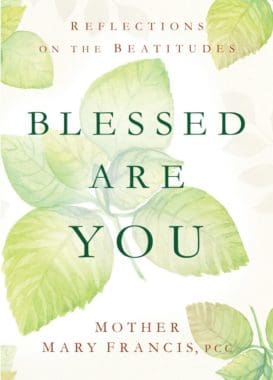Blessed are the meek:
for they shall possess the land
Christ went on to tell His doubtless spellbound listeners about a large legacy and who was to receive it. Some people were to inherit the land, to possess the earth. Their identification must certainly have been startling to that large congregation on the hillside. Meekness then, even as now, was not generally considered to be the outstanding mark of large landowners. Yet that was what He said. “Blessed are the meek: for they shall possess the land” (Matt. 5:4).
Our chaplain, Father Burcard Fischer, O.F.M., once remarked in a homily and with quite some acuity that the first land the meek possess is the land they are standing on. They are whole persons. They take that firm stance that only the gentle can really assume. The domineering, the aggressive, the blustering are not so much taking a stance as posturing. What we shall want first to consider in the meek, then, is their strength.
The meek are the self-possessed, which is to say that they are God-possessed since God has been allowed to possess their “selves.” The arrogant and aggressive have leased their “selves” out to their acquisitiveness, their ambition, their desire to domineer. And while it is a poor enough bargain, they seem to go on renewing the lease for the meager return, the even self-destructive return. They never really possess the land on which they stand; they merely wage war over it.
If meekness is not exactly the worldly ideal, neither is it universally correlated with strength. Contrariwise, is not the first connotation of meekness in many minds that of supineness, spiritlessness, weakness? It is strange that this should be so, when Jesus set forth meekness as the expression of His own divine-human heart. It is interesting that Christ asked us to master only one lesson plan in life: “Learn of me, because I am meek, and humble of heart” (Matt. 11:29). It is certainly not without significance that He never specifically asked us to learn anything else. He knew the hearts of men and what was in them then, what is in them now. He understood that excellence in humility and meekness requires the practiced ease possible only to a whole lifetime of striving. A doctorate in meekness requires a studious dedication that not too many are prepared to make.
We remember that our blessed Lord also spoke of taking on a yoke. “Take my yoke upon you, and learn of me, because I am meek, and humble of heart” (Matt. 11:29). Meekness is the very opposite of irresponsibility. Rather, in opting for emulation of the meek Christ, we are agreeing to take on a highly demanding responsibility. But there is this about the heaviest responsibilities: they are never oppressive. It can be, after all, highly exhilarating to lift something heavy and carry it. It requires much practice and dogged determination, but among the rewards are the experience of spiritual élan in oneself and the presentation of a beautiful example to others.
When the danseur lifts the ballerina high into the air and seems to float her about over his head, it is not because obscure gravitational statistics of the dance reveal that one hundred and ten pounds become ten pounds when delivered from earthly moorings. No, rather the danseur has learned how to lift a one-hundred-pounds-plus burden that is sweet to him. The weight has become a part of the beauty he is creatively expressing. He is for us a model of bearing heavy responsibility, quite literally, with ease and grace. He has had to learn how to do this. The danseur has been obliged to try and to experience failure and then to try again and again and again. The weight of responsibility borne with practiced grace has been transformed into the lightness of achievement. But one has to bear the burden, to carry it, to lift it, to sweep it up. It will always be nothing but oppressive when pulled or dragged along.
Jesus again invites us to respond to his initiative with our own. It is His yoke, this humility, this meekness. But we are to take it up. He does not yoke it upon us but suggests that we yoke it upon ourselves. His yoke becomes our elected own. “Take my yoke upon you.” There must be the labor of learning to lift the burden before we can discover the burden light. Excellence in meekness is not for the lethargic, the apathetic, the ungenerous. But it is more than élan that our blessed Savior promises us for becoming practiced in His meekness. He talks of rest: “And you shall find rest for your souls.”
Reposefulness is an outstanding characteristic of the meek. And it is more the magnificent reposefulness of the mountain, firm and strong and equal to the blast of adverse winds, than of the sleeper. One could agree that the meek possess the land they are standing on and go on to add that they possess themselves. The Beatitudes were not departmentalized by Christ. One flows into another. The next is possible because of the others. One expression leads to another. Each in a sense explains all the others. And so that quality (and not only state) of being without holdings, the characteristic of the poor in spirit, is clearly illustrated by the meek.
Because they are without holdings, the meek actually hold everything. We see this patently in the life of St. Francis. The poet’s fancy of “swinging the earth a trinket at my wrist” became spiritual reality in the little Poor Man of Assisi. That all the earth was his is apparent in the way Francis dealt with the earth. He communed with it, eulogized it, singing expressions of its Creator, was literally familial with it. There was never a man more at home in creation than meek Francis of Assisi. To the pilgrim alone belongs the land, for the pilgrim is only happily passing through. He is not about to declare wars of colonization. He does not in fact need colonies. He has it all.
Thus there is this reposefulness about the meek. Without aggressiveness (he suffers no grinding to possess), without arrogance (for he is a son and heir of a Master whose infinite holdings are never in jeopardy and who assigns meekness as birthright to His progeny), he is at rest. The world is so torn with aggression, so swollen with arrogance. For this acute restiveness and for this diseasedness there is no repose. Rather than submit to this prognosis, we often enough pretend to despise reposefulness. Life is for action, protest, apprehension! But we shall want to reflect a bit later that the hunger and thirst for justice that signals yet another Beatitude calls for an action, a protest, and an apprehension possible only to the meek.
Flailing one’s arms about becomes in the end merely exhausting, and that kind of exhaustion makes repose impossible. Insisting on one’s rights, suing for them with merciless domination, fills the air with noise but never with music. Music belongs to the meek who have the strength to suffer all things patiently for the love of Christ and, in the end to “count them but as dung, that I may gain Christ” (Phil. 3:8).
“You shall find rest to your souls” (Matt. 11:29). The strength of the meek, the strength that is able to suffer and to suffer gladly, is identified in reposefulness. And in this reposefulness one can experience what it is to possess the land. Only those who do not stake out particular holdings are free enough to possess all of the earth. The meek have learned to possess their own souls in peace. Therefore they stand without fear upon the land become theirs not by acquisition but by gift and reward. And they become free to roam the whole territory of their inheritance: the earth.
So it was that Jesus said: Blessed are the meek; they shall own everything. They shall possess the whole land. They indeed possess everything who do not stake out any holdings. We need, however, to ask how often and how obstinately we deliver ourselves up to acquisitiveness. We want to own some ideas and judgments and to stake out claims on them. This is my sovereign opinion, which no one shall alter! Certainly, we have basic convictions, but this does not entail succumbing to the aggressiveness of “This is my charge, this is my work; keep out, keep off the grass of my holdings.” This idea that is my “holding” is often enough the mistaken idea on which no one is going to correct me. I put up signs and observe squatters’ rights. What a dreary business, when we can run and own the land and possess the earth if we are meek and humble of heart!
It is the unending drone of the squatter and his rights that “This is mine. And anyone who wants to liberate me doesn’t understand.” There rises the age-old cry: “You don’t understand me.” “This is my truth.” Or, perhaps more accurately, my verisimilitude. And no one shall intrude here. No one shall bring in the truth here. No one shall point to a vision of something far greater. And so I can sit there and squat there on my holdings, proud, determined on this ownership, and, of course, forced to defend it. As our Father St. Francis said, “If we own property, my brothers, then we shall have to have weapons to defend it.” And he went on to say that this gets more and more complicated. That is just what happens to us when we stake out a holding. We must have weapons to defend it. Somebody is coming to say that I am wrong, but I have weapons to defend my error. And when we are busily defending this little plot with weapons of pride, weapons of blindness, weapons of arrogance, we refuse to possess the land promised to the meek.
Our Lord Jesus Christ has advised us that this is a very meager way of living. In the end, it is to render life wasted, squandered, lost. He points the direction away from such tragedy. Come to possession of the earth! Possess yourselves in reposefulness of soul. Take up My yoke and stand responsible, yoked, upon firm land. Learn of Me; I am meek and humble of heart. And here is your diploma: the earth.
+
This article is adapted from a chapter in Blessed Are You by Mother Mary Francis, PCC, which is available from Sophia Institute Press.
Art for this post: Cover and featured image used with permission.






